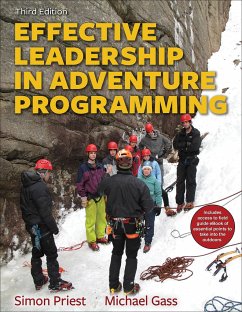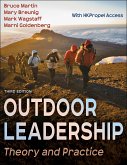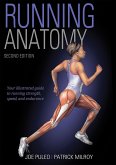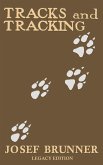Simon Priest, Michael Gass
Effective Leadership in Adventure Programming 3rd Edition With Web Resource
Simon Priest, Michael Gass
Effective Leadership in Adventure Programming 3rd Edition With Web Resource
- Broschiertes Buch
- Merkliste
- Auf die Merkliste
- Bewerten Bewerten
- Teilen
- Produkt teilen
- Produkterinnerung
- Produkterinnerung
Effective Leadership in Adventure Programming, Third Edition, details the art and science of adventure leadership. This thorough update of the groundbreaking text covers the latest research, issues, and trends in adventure education and provides a new model for building core competencies.
Andere Kunden interessierten sich auch für
![Outdoor Leadership Outdoor Leadership]() Bruce MartinOutdoor Leadership98,99 €
Bruce MartinOutdoor Leadership98,99 €![Daniels' Running Formula Daniels' Running Formula]() Jack DanielsDaniels' Running Formula22,99 €
Jack DanielsDaniels' Running Formula22,99 €![Running Anatomy Running Anatomy]() Joe PuleoRunning Anatomy30,99 €
Joe PuleoRunning Anatomy30,99 €![Outdoor Education Outdoor Education]() Ken GilbertsonOutdoor Education108,99 €
Ken GilbertsonOutdoor Education108,99 €![Applied Sport Mechanics 4th Edition with Web Resource Applied Sport Mechanics 4th Edition with Web Resource]() Brendan BurkettApplied Sport Mechanics 4th Edition with Web Resource83,99 €
Brendan BurkettApplied Sport Mechanics 4th Edition with Web Resource83,99 €![Tracks and Tracking (Legacy Edition) Tracks and Tracking (Legacy Edition)]() Josef BrunnerTracks and Tracking (Legacy Edition)20,99 €
Josef BrunnerTracks and Tracking (Legacy Edition)20,99 €![Every Dog Deserves an Adventure Every Dog Deserves an Adventure]() Camping with DogsEvery Dog Deserves an Adventure26,99 €
Camping with DogsEvery Dog Deserves an Adventure26,99 €-
-
-
Effective Leadership in Adventure Programming, Third Edition, details the art and science of adventure leadership. This thorough update of the groundbreaking text covers the latest research, issues, and trends in adventure education and provides a new model for building core competencies.
Produktdetails
- Produktdetails
- Verlag: Human Kinetics Publishers
- 3 ed
- Seitenzahl: 448
- Erscheinungstermin: 22. Dezember 2017
- Englisch
- Abmessung: 216mm x 283mm x 22mm
- Gewicht: 1260g
- ISBN-13: 9781492547860
- ISBN-10: 1492547867
- Artikelnr.: 48939095
- Herstellerkennzeichnung
- Libri GmbH
- Europaallee 1
- 36244 Bad Hersfeld
- gpsr@libri.de
- Verlag: Human Kinetics Publishers
- 3 ed
- Seitenzahl: 448
- Erscheinungstermin: 22. Dezember 2017
- Englisch
- Abmessung: 216mm x 283mm x 22mm
- Gewicht: 1260g
- ISBN-13: 9781492547860
- ISBN-10: 1492547867
- Artikelnr.: 48939095
- Herstellerkennzeichnung
- Libri GmbH
- Europaallee 1
- 36244 Bad Hersfeld
- gpsr@libri.de
Both Simon Priest and Mike Gass are subject matter experts in outdoor leadership, adventure programming, and the facilitation of learning and change. They have separately authored hundreds of publications, presented thousands of experiential workshops, and delivered dozens of keynote addresses for conferences. They have taught in more than 60 nations around the world, and they enjoy collaborating on scholarly endeavors and climbing mountains together. Dr. Simon Priest is a Canadian from Burnaby, British Columbia (near Vancouver). His areas of expertise include corporate training and development, wilderness resource management, and adventure travel and ecotourism. In addition to being a dean, provost, vice chancellor, senior vice president, president, and commissioner, he has held full professorships in business management, online education, and recreation and leisure. He has received more than 15 awards for his teaching and research, including the Willi Unsoeld Award from the Association for Experiential Education, and he has been invited as a visiting scholar at about 30 international institutions. Dr. Michael Gass is an American from Durham, New Hampshire (near Boston). His areas of expertise include adventure therapy, wilderness orientation programs, and program accreditation. He is the director of the Outdoor Behavioral Healthcare Research Center (OBHRC) as well as the National Association for Therapeutic Schools and Programs (NATSAP) research database. He is a full professor at the University of New Hampshire as well as a licensed marriage and family therapist. He currently leads and directs several critical research initiatives in the field of behavioral health care. He has received more than 20 awards, including the Kurt Hahn Award, Distinguished Researcher Award, and Outstanding Teacher Award from the Association for Experiential Education. He has been invited as a visiting scholar at about 20 international institutions.
Introduction
Chapter 1: Evidence
Chapter 2: Philosophy
Chapter 3: Professonal Ethics
Chapter 4: History
Chapter 5: Technical Activity Skills
Chapter 6: Safety and Risk Skills
Chapter 7: Environmental Skills
Chapter 8: Organizational Skills
Chapter 9: Social Psychology
Chapter 10: Conditional Leadership
Chapter 11: Communication
Chapter 12: Instructional Skills
Chapter 13: Facilitation Skills
Chapter 14: Decision Making
Chapter 15: Problem Solving
Chapter 16: Sound Judgment
Chapter 17: Trends and Issues
Conclusion
Appendix: Therapeutic Applications
Glossary
Index
Chapter 1: Evidence
Chapter 2: Philosophy
Chapter 3: Professonal Ethics
Chapter 4: History
Chapter 5: Technical Activity Skills
Chapter 6: Safety and Risk Skills
Chapter 7: Environmental Skills
Chapter 8: Organizational Skills
Chapter 9: Social Psychology
Chapter 10: Conditional Leadership
Chapter 11: Communication
Chapter 12: Instructional Skills
Chapter 13: Facilitation Skills
Chapter 14: Decision Making
Chapter 15: Problem Solving
Chapter 16: Sound Judgment
Chapter 17: Trends and Issues
Conclusion
Appendix: Therapeutic Applications
Glossary
Index
Introduction
Chapter 1: Evidence
Chapter 2: Philosophy
Chapter 3: Professonal Ethics
Chapter 4: History
Chapter 5: Technical Activity Skills
Chapter 6: Safety and Risk Skills
Chapter 7: Environmental Skills
Chapter 8: Organizational Skills
Chapter 9: Social Psychology
Chapter 10: Conditional Leadership
Chapter 11: Communication
Chapter 12: Instructional Skills
Chapter 13: Facilitation Skills
Chapter 14: Decision Making
Chapter 15: Problem Solving
Chapter 16: Sound Judgment
Chapter 17: Trends and Issues
Conclusion
Appendix: Therapeutic Applications
Glossary
Index
Chapter 1: Evidence
Chapter 2: Philosophy
Chapter 3: Professonal Ethics
Chapter 4: History
Chapter 5: Technical Activity Skills
Chapter 6: Safety and Risk Skills
Chapter 7: Environmental Skills
Chapter 8: Organizational Skills
Chapter 9: Social Psychology
Chapter 10: Conditional Leadership
Chapter 11: Communication
Chapter 12: Instructional Skills
Chapter 13: Facilitation Skills
Chapter 14: Decision Making
Chapter 15: Problem Solving
Chapter 16: Sound Judgment
Chapter 17: Trends and Issues
Conclusion
Appendix: Therapeutic Applications
Glossary
Index








